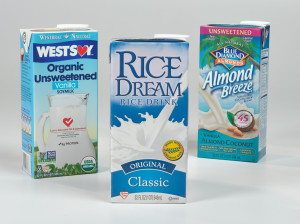Kidney Diet Tip: Choosing the Best Milk Substitute
 Cow’s milk is naturally high in protein and minerals. An 8-ounce cup of 1% low fat milk contains 8 grams protein, 366 mg potassium, 232 mg phosphorus, 305 mg calcium, 107 mg sodium and 27 mg magnesium.
Cow’s milk is naturally high in protein and minerals. An 8-ounce cup of 1% low fat milk contains 8 grams protein, 366 mg potassium, 232 mg phosphorus, 305 mg calcium, 107 mg sodium and 27 mg magnesium.
Because of the high levels of potassium and phosphorus in milk, people with severe or total loss of kidney function (stages 4 and 5 chronic kidney disease) are generally advised to limit milk to 4 to 8 ounces a day. Non-dairy milk substitutes such as almond, rice or soy milk are recommended instead. Nondairy creamers were once a popular milk substitute, but most, if not all, now contain potassium and phosphate additives and have fallen off the list of recommended milk replacements.
There are many product variations, even within a given brand–original or enhanced, refrigerated or shelf-stable, plain or flavored, sweetened or unsweetened. The best milk substitutes are usually labeled original; do not contain phosphate additives; and have less than 200 mg potassium for 8 ounces.
Protein in nut and rice milk substitutes is usually much lower than protein in cow’s milk. Protein in soy milk is comparable to cow’s milk. Some manufacturers add pea and rice protein to increase protein content of rice and nut milk.
Potassium varies greatly in milk substitutes. Soy milk is naturally high in potassium, ranging from 250 to 440 mg for 8 ounces. Almond milk ranges from 150 to 250 mg potassium, and rice milk is lowest with a range from 20 to 80 mg. For kidney patients, the best choice is often determined by potassium from blood test results. If levels are high, soy milk is not a good milk substitute.
Almond, rice and soy milk may contain calcium phosphate, magnesium phosphate, or tri-calcium phosphate. Some brands contain multiple additives. It’s important to read the ingredient list with each purchase to find products without phosphate additives. Almond milk without phosphate additives is usually low in phosphorus, around 20 mg for 8 ounces, but increases 150 to 200 mg if phosphates are added. Most of the phosphorus remains in the almond meal that is separated from almond milk during processing. Rice milk without phosphate additives has around 50 mg phosphorus per cup, and ranges from 100 to 150 mg if enriched with phosphates. Soy milk is naturally high in phosphorus with 80 to 150 mg and increases to 250 mg when phosphates are added. Many products do not list phosphorus on the label, and for some the values are not available from food manufacturers.
Calcium is often added to milk substitutes to mimic or exceed calcium content of cow’s milk. Several brands of almond, rice and soy milk contain 450 mg calcium for only 8 ounces, or 45% of the recommended daily intake. These are not good choices if calcium from blood test results is high, but not a concern when calcium is low or normal.
Milk substitutes may not ‘act’ like cow’s milk when used in food preparation. For example, instant puddings may not thicken, and quality of baked goods may decrease when milk is replaced with a substitute.
Nutrient content and ingredients vary with different milk substitutes, and the best choice may depend on potassium, phosphorus and calcium from blood test results. Talk to your dietitian for more information on the best milk substitutes for you.
Additional Kidney Diet Resources
Visit DaVita.com and explore these diet and nutrition resources:
DaVita Kidney-Friendly Recipes
This article is for informational purposes only and is not a substitute for medical advice or treatment. Consult your physician and dietitian regarding your specific diagnosis, treatment, diet and health questions.

Recent Comments